The last time the Gellért Bath as we know it opened its doors
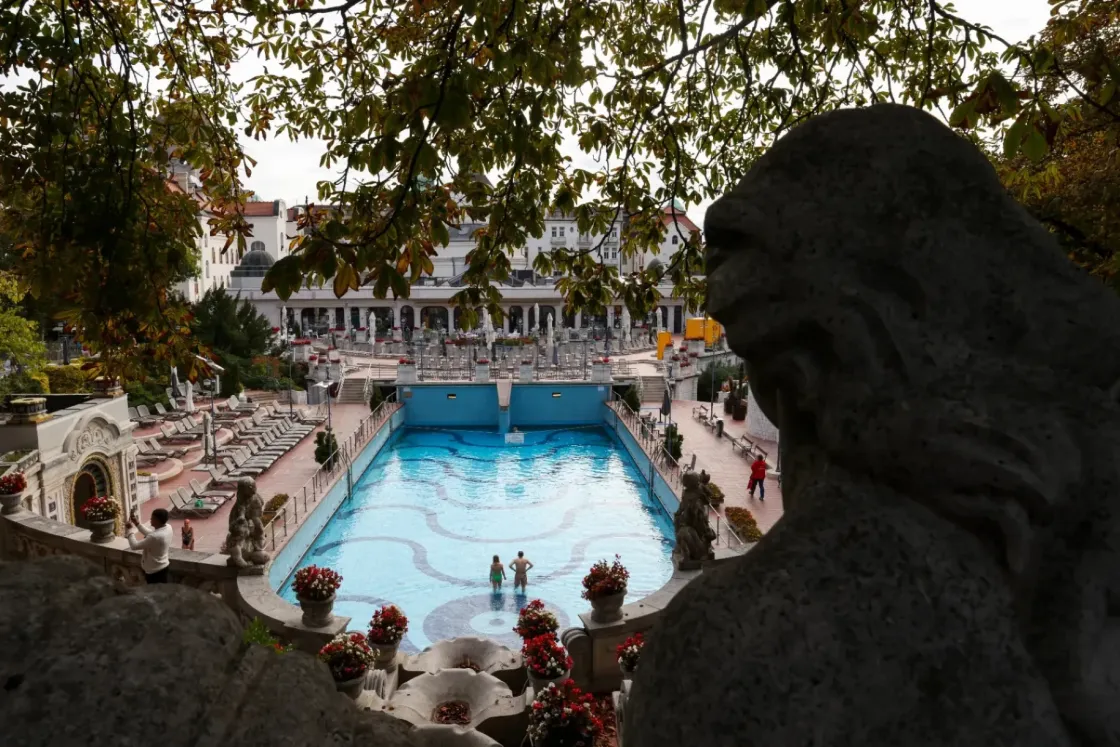
"Where's your tailcoat?" one employee turns to another as they exchange greetings for the last time at 8:30 a.m. on Tuesday morning at the entrance to the Gellért Bath. Just as the gentleman isn't wearing a tailcoat, there isn't one to be found anywhere nearby, and even on the bath itself there are no decorations signaling mourning, although theoretically there could be. The Gellér Bath is "expected" to be closed for renovation until 2028. The word "expected" is loaded with meaning whenever it appears in an official announcement, because who knows what will happen in Hungary in three years' time. Here, we don't consider such timeframes as prospects, but rather as finish lines that time, money, leadership, and the world will most likely keep pushing further and further out, until after a while we find ourselves not even knowing when we started running.
Gellért Bath is certainly in need of refurbishment, but an equally important argument in favor of its closure is the renovation of the adjacent hotel. As I enter the building just before the official opening time, the sound of jackhammers quickly shatters the calm. Renovation inevitably comes with noise and dust, and those working on the hotel are only allowed to carry out loud work until 9 a.m. But one cannot contain dust. Later, when I return to the lobby after a few hours of relaxation, it feels as if the area had been filled with smog.
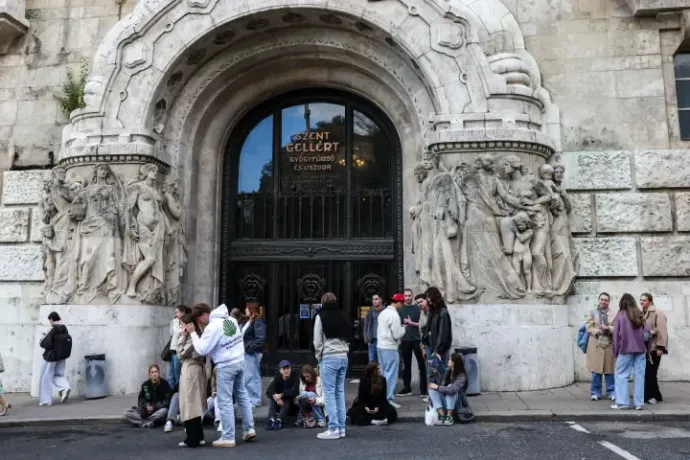
Although the bath had officially bid farewell to itself the weekend before, with various events and a guided tour for the press, the last time the Gellért was open to customers prior to the renovation was on September 30. This was the last day when the Gellért Bath looked more or less the same as it did when the wave pool was first opened in 1927. That was precisely what made it so appealing: it looked as if the leisure activities of different eras had all been blended together. Those who came here could feel as if they were in the 1920s of two different centuries, combined with a few defining periods in between. Tourists still loved it on Tuesday, and it was hard to tell whether those who were taking pictures of everything were doing so because that's what they would do anyway, or because they were saying goodbye.
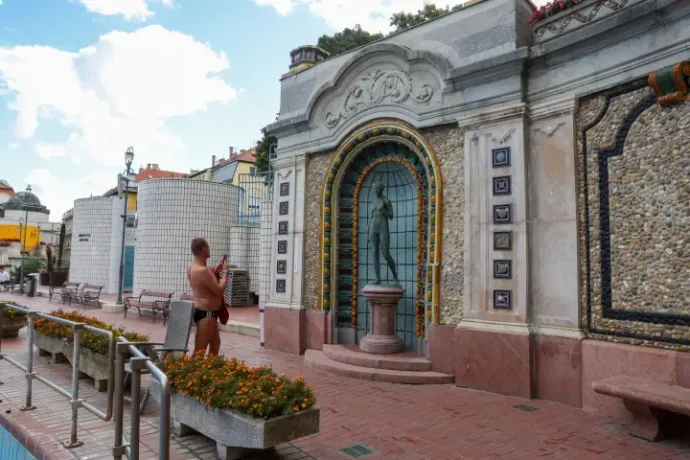
It wasn't just the guests who were taking photos of the bath, but the staff too. Wherever I looked in the minutes before opening, there would always be someone with their phone in hand, taking photos and videos to memorise the last day. This is only my second time at the Gellért, so I 'm not particularly nostalgic, but as I sit outside in the ridiculously bright sunshine, it seems hard to imagine how it could ever look different. I see the empty plot of land where the children's pools used to be, awaiting development, and the hotel which is currently under renovation, with everything around it being modernized. But things are crumbling in the baths: one of the drinking fountains in the men's thermal bath looks as if The Hulk had punched a hole in the wall and left it that way. The mosaics are incomplete, the showers are in dire need of renovation, and as Edit Réffy, communications officer at Budapest Gyógyfürdői és Hévizei Zrt. (Budapest Spas and Thermal Baths Ltd.), said of the columns of the indoor cold water pool: they look nice, but who knows what's inside.
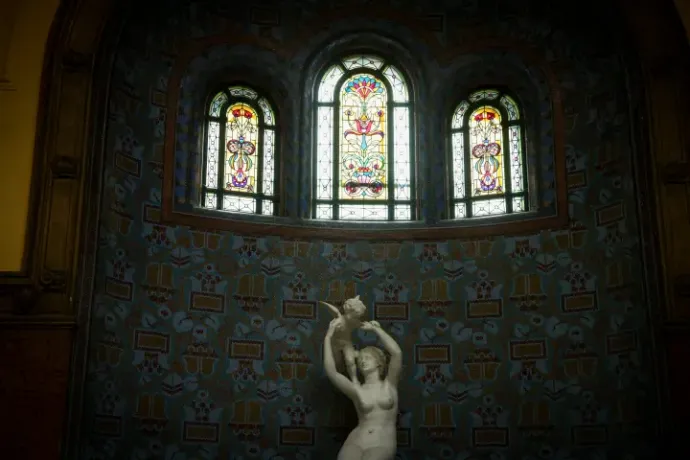
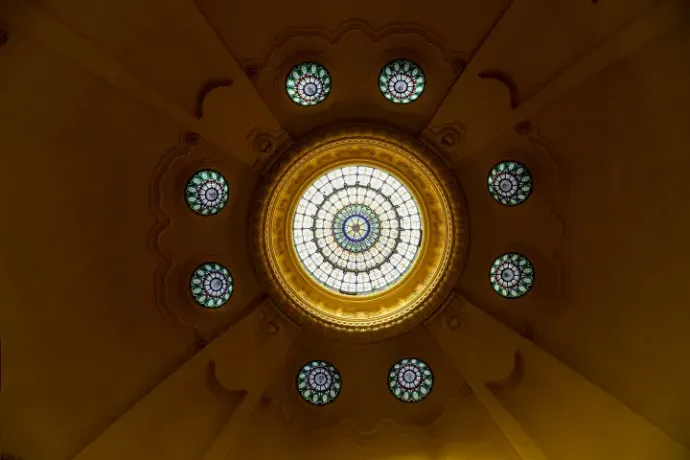
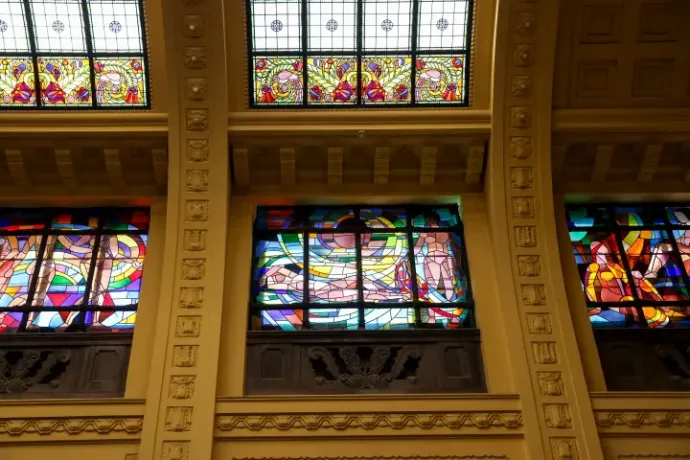
In the minutes before opening, the employees greet each other one last time in these surroundings. Some brought fruit juice specifically to toast with the regulars. In theory, all the employees have been given positions at another spa, but I am not so certain of this when I enter the snack bar called WineSpa. All you need to know about the WineSpa is that its decor is rather tacky, and it looks as if someone had combined all the bad ideas from Pinterest, four deciliters of Borsodi cost 2,300 forints, and the advertising screen in the front sometimes switches to a slide that says "Coffee break." Perhaps it is too late to fix it now. When I first enter the WineSpa, the employees are reading the section of the labor law concerning termination of employment out loud.
By 9.02 AM, the regulars are already in the outdoor adventure pool, but there isn't the rush I would have expected on Gellért's last day. Tourists are also slowly trickling in, braving the cold outdoor pool in the still gloomy weather. After all, the 13,000 forint admission fee is quite steep, so you've got to make the most of your time inside. This is what encourages me to sit in the steam bath, where after taking just two steps I can't see a thing, and after half a minute I realize I've gotten dangerously close to the wall. I climb onto the bench and sit down next to the wall, only to have three tourists immediately sit down next to me. I move down a level, at which point the steam begins to come up to my feet as if I were about to be transformed into braised cabbage, so I decide that it's best if I leave immediately.
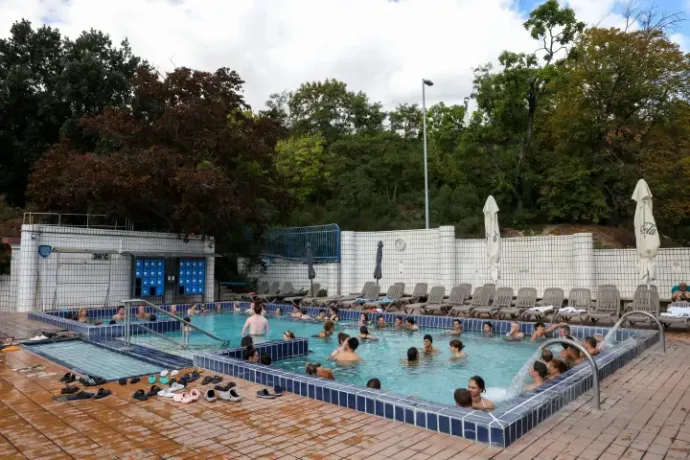
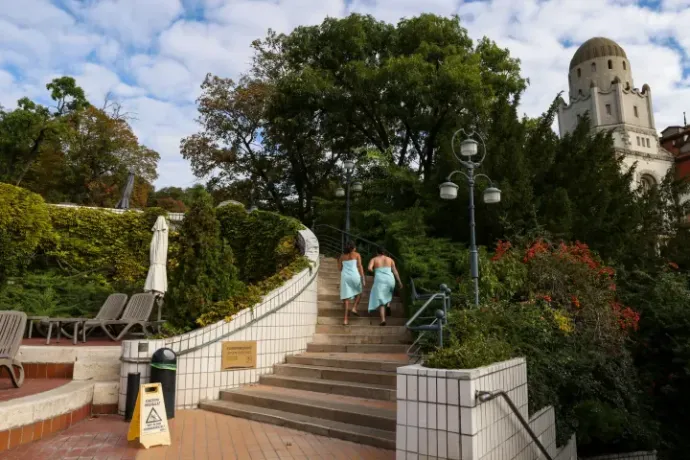
One cannot go wrong with the outdoor adventure pool, although it is interesting to ponder when it became "adventurous" to have water come gushing down on us with great force and noise. Being in the outdoor pool is absolutely wonderful. By now, the sun has started to shine, and thanks to the strange acoustics, I can hear some people talk about Origó (a pro-government paper), while others are discussing company audits, and someone else is planning a trip to Istanbul. I move closer to an older couple, who were among the first guests to arrive. A younger man with a German accent swims over to join them, and then the two men spend a long time fiddling around under the water, the sparkling sunlight making it difficult to see exactly what they are doing. The older man then massages the younger man's arm, then his neck, shoulders, and body.
The Hungarian gentleman is called Gyuszi, and he used to work as a masseur at Gellért from the 1960s until the early 2000's. He and his girlfriend have been coming to the bath every day with their annual pass, which costs 12,000 forints and is cheaper than buying a single ticket. "The days are so long. We get up at 5 a.m. and go to bed at night," they say when explaining why they come here every day. From now on, they will go to the Szécsenyi Bath, but they are still figuring out the best route for getting there. The German gentleman used to work as an engineer for a bigger company, and for some reason we quickly start talking about Marx and Engels and the equal distribution of wealth. He reckons Gyuszi may have been a mafioso back in the day, and Gyuszi laughs at this so heartily that I believe him.
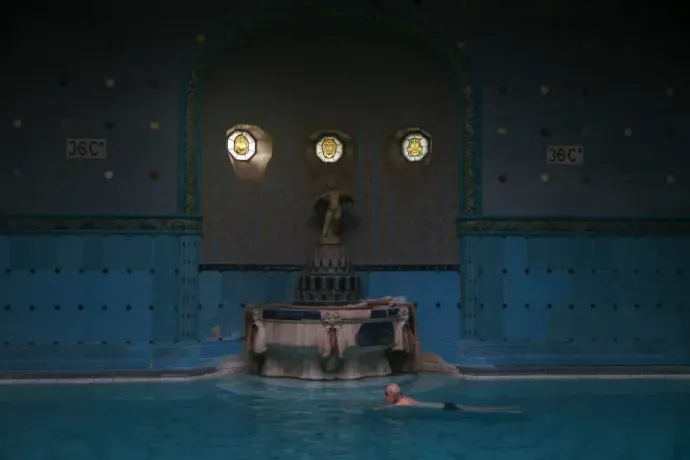
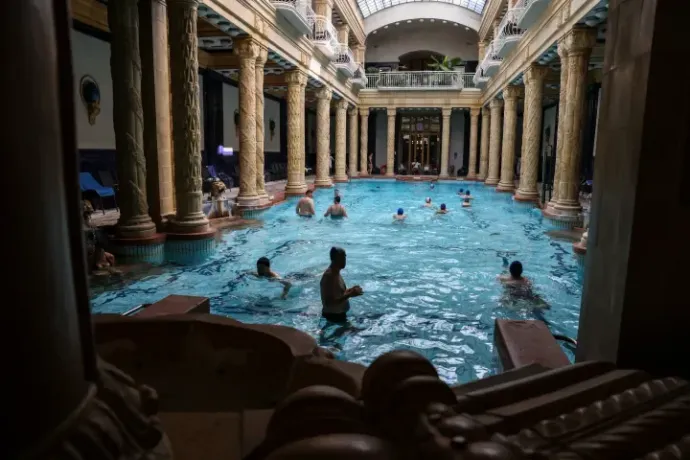
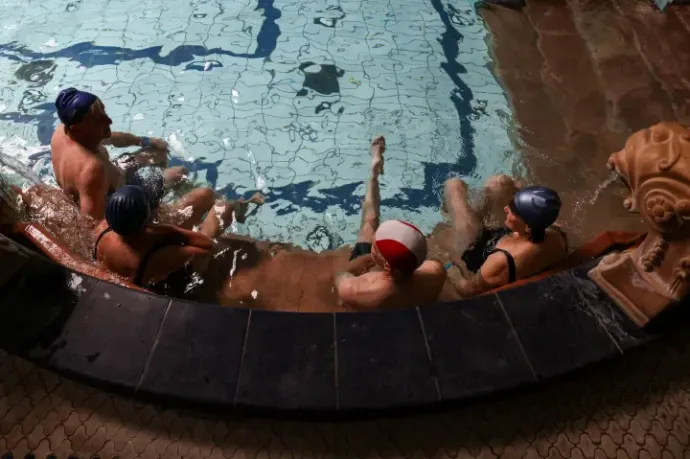
I might be monomaniacal, but in my mind, everything connected to Gellért has to do with sex. In 2011, it was revealed that prior to the previous renovation, a German insurance company had turned the bath into a brothel for its sales representatives, and, according to reports in the German press at the time, prostitutes were paid based on the number of stamps on their arm indicating how many clients they had served. I swear, I'm not making this up. At the end of the 1990s, a Polish video artist filmed the then still segregated female and male audiences without their knowledge, disguising herself as a man with the help of prosthetics. Excerpts from this project can be seen here. I was told that there are sex-friendly cabins in the central, arched, very socialist-style changing room, one just has to find one where no camera can see and where there is ventilation, otherwise one will either end up entertaining the security guards or pass out. This tip won't be of much use in 2028, as the entire section will be demolished and is to be replaced by a modern sauna complex, which, based on the plans, won't be nearly as charming. Although, it may only take fifty years to get there.
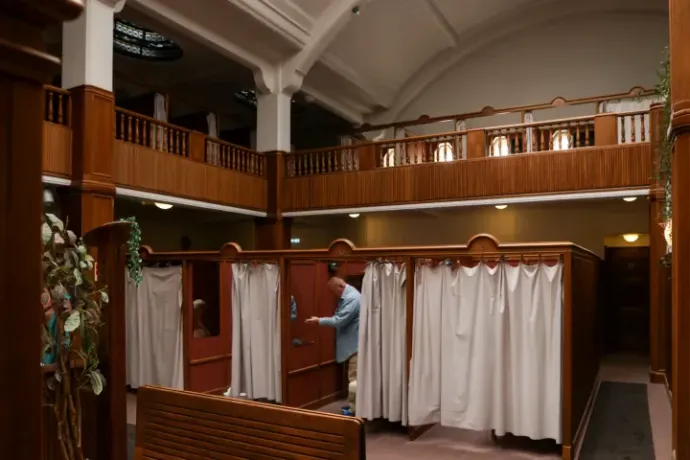
I am trying to determine how this day differs from an average Tuesday morning. It most probably doesn't. The regulars came as usual, except that on this day, the Lukács or Széchenyi Bath will most certainly come up in their discussions. The tourists came too, with some of them perhaps unaware that this is the last day of the bath being open in its current form. While changing in the curtained cubicle, I hear someone slurping soup in the next one over. The slurping stops, and he says, "Like a kiss to the deceased." Hoping to catch something symbolic to write about, I go into the lobby and sit down to watch the guests as they continue to arrive at noon on a Tuesday, but no such thing happens. I get up, go outside, and only then do I realize that I am the only person who has come out.
For more quick, accurate and impartial news from and about Hungary, subscribe to the Telex English newsletter!